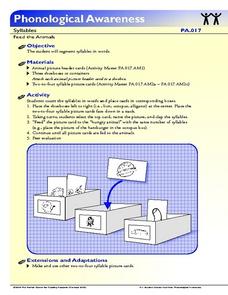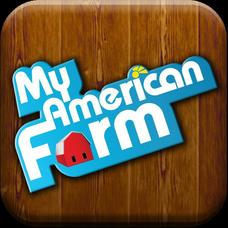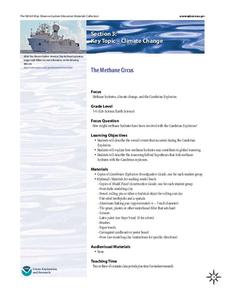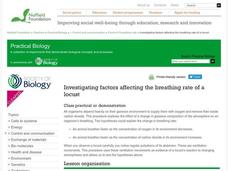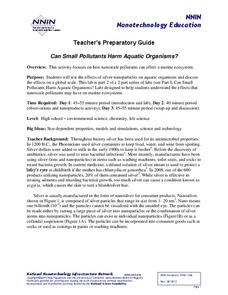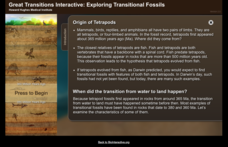Curated OER
Name that animal
A great way to classify organisms, is by counting the number of legs it has or how it moves. Little ones count the legs on five different creatures, then match the leg count to the proper animal name. Tip: Have them come up with other...
Curated OER
Getting Together - a Groupings Crossword Puzzle
Introduce your class to words for groups of animals and people. This is a crossword puzzle that includes 25 clues for collective nouns. The puzzle is online interactive and learners can receive immediate online feedback. Answers are not...
Curated OER
Exploring Descriptive Sounds
"The Carnival of the Animals" is a piece written by Saint-Saens, and is full of descriptive sounds that help tell a story through music. Included here are a set of images that represent the animal sounds in the piece.
Curated OER
Animals of the Arctic
Sixth graders research an Arctic animal. They survey the questions in the Animal Report in order to conduct their research. They investigate their chosen animal by using the Internet, library books and reference books.
Florida Center for Reading Research
Phonological Awareness: Syllables, Feed the Animals
An activity challenges scholars to sort picture cards based on the number of syllables they count as they say the item's name on each card. Depending on how many syllables they count, they place the card in the corresponding box...
Curated OER
Papier Mache Animals Sculptures
Fourth graders construct papier mache sculptures that emphasize texture, form and color. Each student chooses and constructs a unique papier mache sculpture of a farm animal..
Curated OER
Animals and Humans
Students identify the functions of various body parts. They participate in the "Head, Shoulders, Knees, and Toes" song, draw a picture of themselves and other mammals, and create a traced outline of their body that they add features to....
K12 Reader
Antonym Animals
What's the antonym for wild? What's the opposite of young? Young readers identify the antonyms in a series of ten sentences. Next, they jot down the word pairs to reinforce the relationship between each set of antonym.
Alabama Wildlife Federation
Wildlife Habitat Checklist
Take a walk on the wild side with a project about animal habitats. After kids observe a chosen animal in its home, they describe the animal's food and water sources, shelter, and how it raises its young. They then write a short fictional...
Curated OER
Animal Science as Agriculture
The methods by which farming and agriculture became a valid area of study and research are detailed in this PowerPoint. Also presented are the steps involved for improving productivity and efficiency. The use of scientific method and...
Curated OER
Animal Reproduction
It is likely that this PowerPoint was designed for the distinct study of male animal husbandry. The components of the male reproductive system is clear and detailed. Pictures do not graphically illustrate these parts, but the vocabulary...
National Wildlife Federation
Who Is Faster?
Am I going to catch it? Individuals time how long it takes them to walk, jog, and run a given distance and calculate their speed. They then research two animals and find their speeds. Using a chart, pupils compare the speeds of the...
Worksheet Web
Burrowing Animals – Ground Squirrels
Why do ground squirrels build their homes in the ground? What's so unique about these burrows? Have individuals read about this burrowing animal, and then respond to five short answer questions that assess their comprehension of the...
Curated OER
Fun with Fictitious Animals
How can one differentiate between a dweezlebub and nessie? Use this fictitious creature dichotomous key to find out! Biologists of all ages will enjoy this creative way to learn about classification, including a chance to draw the...
American Farm Bureau Foundation for Agriculture
My American Farm
Hee-haw! Have a bale of fun with these agricultural games! Five games are geared up for kindergarten through fifth grades and are useful for addressing Common Core standards in mathematics.
Curated OER
Old McDonald Dice
Old McDonald had a...die with different barnyard animals on it! This fun template will put a new spin on the classic children's song by letting the roll of a die determine which verse to sing next. Consider printing the dice on card...
Super Teacher Worksheets
Mammal Scavenger Hunt Activity
Did you know that a polar bear's skin is actually black? Or that the lightest mammal weighs less than a paperclip? Young scientists learn these and other amazing facts about mammals as they explore the animal kingdom with this fun...
EngageNY
Grade 9 ELA Module 3, Unit 1, Lesson 2
Autism isn't an illness or a disability. In the first chapter of Animals in Translation, we learn about Temple Grandin's unique ability to understand animals through her experience with autism. Having read pages four through eight for...
Rainforest Alliance
How Do Jaguars and Howler Monkeys in Belize Depend on Us?
How does weather play a role in the lives of land and sea creatures? Find out with a lesson focused on habitats and the ways animals from different homes are connected. Here, learners explore how the life of a jaguar and howler monkey...
NOAA
The Methane Circus
Step right up! An engaging research-centered lesson, the third in a series of six, has young archaeologists study the amazing animals of the Cambrian explosion. Working in groups, they profile a breathtaking and odd creature and learn...
Nuffield Foundation
Investigating Factors Affecting the Breathing Rate of a Locust
Do animals breathe faster when given more oxygen or more carbon dioxide? Young scientists observe the respiration rates of locusts under a variety of gas concentrations to answer that very question. They collect data, analyze the...
National Nanotechnology Infrastructure Network
Can Small Pollutants Harm Aquatic Organisms?
Nanoparticles have toxic effects on plant and animal life—even though you can't see them. The second instructional activity of a two-part series has young scientists conduct an experiment that exposes plant and animals to nanoparticle...
Howard Hughes Medical Institute
Great Transitions Interactive
How did life evolve from fish to four-limbed animals? Work through an interactive exploring transition animals and comparing their features to understand the transition. Making it even better, the interactive allows scholars to isolate...
Curated OER
Animals of the Lost City
Begin with a demonstration of exothermic reactions and discussion of chemosynthesis. Your aspiring oceanographers research vent communities and then craft a mural of a vent community. This is a terrific method of introducing learners to...
Other popular searches
- Farm Animals
- Zoo Animals
- Nocturnal Animals
- Prehistoric Animals
- Arctic Animals
- Jungle Animals
- Plants and Animals
- Desert Animals
- Animals and Their Habitats
- Oviparous Animals
- Classification of Animals
- Winter Animals






